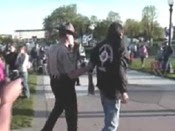Police Attack Protest of Minnesota Anti-Indian Racism

Protest Turns Violent At Sesquicentennial Event
video here
and here
Why Some Indigenous People Are Upset With Minnesota
ST. PAUL (WCCO) ― What began as a solemn ceremony celebrating Minnesota's 150th birthday turned into a raucous protest at the State Capitol on Sunday.
For some Native Americans in Minnesota, the beginning of statehood was the end of their way of life. Several dozen protested the Minnesota birthday party carrying hangmen nooses.
A protester hit a Minnesota State Trooper on the head with a plastic bottle as police tried to clear an area during the celebration. Three people were arrested.
For Dakota people, part of Minnesota's history includes the hangings at Mankato of 38 Indians for their part in the Dakota War of 1862. To this day, it remains the largest mass execution in U.S. history.
"That's all they have to do is tell the truth, and apologize, and say I am sorry for what happened to the Native people. That's all they have to do. They won't even do that," said Clyde Bellecourt of the American Indian Movement.
Dean Urdahl, a Republican State Representative from Grove City and a former history teacher, has written a book called "Uprising" about the Dakota struggles.
"They believe that they had been cheated through the treaties. Also they could make the case that by the white government not fulfilling the obligations of treaties, that their people were being starved, that their children were dying," said Urdahl.
Protesters say Minnesota hasn't done enough to acknowledge injustices done to Minnesota tribes, and they're using the state's birthday celebrations to make their point.
"I am invisible in the sense that all the Minnesotans up there on the steps of the State Capitol are willing to ignore oppression and injustice occurring right behind them," said protester Waziyatawin.
Dakota leaders said the Minnesota's Native Americans have some of the highest school dropout and unemployment rates. They also have some of the lowest life expectancy and highest poverty rates.
The Minnesota Sesquicentennial Commission has acknowledged the opinions of the Dakota leaders. Last week the city of Winona was "Capitol for a Day" and the Sesquicentennial Commission sponsored what it called a Truth and Reconciliation Circle to talk about what happened when white settlers came to Minnesota.

0 Comments:
Post a Comment
<< Home